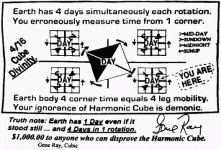Speakpigeon
Contributor
- Joined
- Feb 4, 2009
- Messages
- 6,317
- Location
- Paris, France, EU
- Basic Beliefs
- Rationality (i.e. facts + logic), Scepticism (not just about God but also everything beyond my subjective experience)
Logic is fundamental. It is fundamental to all reasoning and indeed to all the propositional beliefs we may come to have, be they scientific or not, such as when we may come to believe that Obama is a liar on the ground that all politicians are liars (I would say myself all humans are liars, but I derail).
I asked why no science of logic, suggesting it would be good to have one. However, I am not therefore asking science to justify the logicality of logic because that would be hopelessly circular. Instead, I'm asking for logic to be properly considered an empirical fact.
Deductive logic is a capability of our brain and an objective performance of all human beings. Indeed, I would add cows and midgets and everything in between to that. Essentially, all species with at least one neuron. Moreover, I m pretty certain that the logical capability of a cow is essentially the same as our. We only have a bigger brain and probably a few extra functionalities to it, such as an articulated language. I would even say that any alien species would have essentially the same logic, although possibly a bigger brain. Logic, in other words, is a natural phenomenon, and thus, something science could investigate, and it is clear that understanding human logic would very likely have tremendous benefits for mankind. It may well be the only way to save us from self-destruction.
If science investigated deductive logic, like it already does human reasoning, something nobody seems to be objecting to, it might be able to produce a formal model that would be correct of human logic (unlike the toy-like ones mathematicians are playing with).
Such a model, implemented on a computer, could be used to replicate human intelligence. Except, computers don't have the same physical limitation as our brain. We can't grow a bigger brain but we are constantly designing and producing bigger and faster computers. We don't know when they will beat the human brain in terms of computational power, but that should not be necessary. Most of what our brain does is tied down to the necessary task of keeping us alive. Computers don't have to spend their time keeping themselves alive and can concentrate instead on the question submitted to them (which explains why a computer can beat our best chess champions to begin with).
We now only need a formal model. What is science waiting for? Why is it not investigating logic? Surely, it's more important that Black Holes or the Big Bang!
EB
I asked why no science of logic, suggesting it would be good to have one. However, I am not therefore asking science to justify the logicality of logic because that would be hopelessly circular. Instead, I'm asking for logic to be properly considered an empirical fact.
Deductive logic is a capability of our brain and an objective performance of all human beings. Indeed, I would add cows and midgets and everything in between to that. Essentially, all species with at least one neuron. Moreover, I m pretty certain that the logical capability of a cow is essentially the same as our. We only have a bigger brain and probably a few extra functionalities to it, such as an articulated language. I would even say that any alien species would have essentially the same logic, although possibly a bigger brain. Logic, in other words, is a natural phenomenon, and thus, something science could investigate, and it is clear that understanding human logic would very likely have tremendous benefits for mankind. It may well be the only way to save us from self-destruction.
If science investigated deductive logic, like it already does human reasoning, something nobody seems to be objecting to, it might be able to produce a formal model that would be correct of human logic (unlike the toy-like ones mathematicians are playing with).
Such a model, implemented on a computer, could be used to replicate human intelligence. Except, computers don't have the same physical limitation as our brain. We can't grow a bigger brain but we are constantly designing and producing bigger and faster computers. We don't know when they will beat the human brain in terms of computational power, but that should not be necessary. Most of what our brain does is tied down to the necessary task of keeping us alive. Computers don't have to spend their time keeping themselves alive and can concentrate instead on the question submitted to them (which explains why a computer can beat our best chess champions to begin with).
We now only need a formal model. What is science waiting for? Why is it not investigating logic? Surely, it's more important that Black Holes or the Big Bang!
EB

